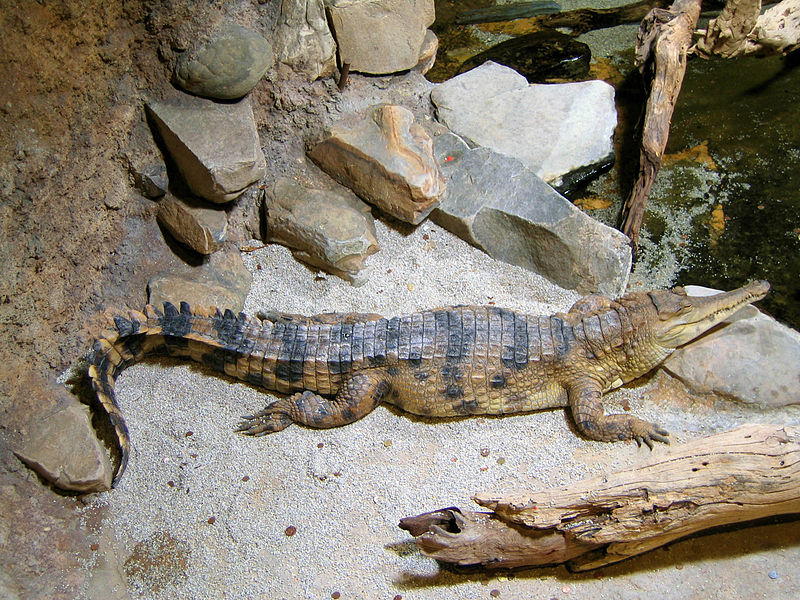Study Announces Discovery of New Species of Crocodile, But Speciation Is Not Evolution, Says Christian Geneticist

A study published by Zootaxa recently outlined the discovery of a new species of crocodile, estimating that the creature arrived on the scene eight million years ago due to volcanic activity in Central Africa. However, a geneticist with Answers in Genesis (AIG) tells Christian News Network that the Genesis Flood is actually the antecedent to the various species of crocodiles, and that speciation is not evolution.
“Scientists in these studies have made certain assumptions about the past to arrive at the millions of years time frame. Those assumptions are based on nothing more than their own ideas about the past, and since man wasn’t present eight million years ago based on their evolutionary timeline, how can they know their assumptions are correct?” asked Dr. Georgia Purdom with AIG, who holds a Ph.D. in Molecular Genetics from Ohio State University.
The crocodile, given the scientific name Mecistops leptorhynchus, had heretofore been considered of the same species as the Mecistops cataphractus crocodiles of West Africa. However, as members of Florida International University’s (FIU) Tropical Conservation Institute, along with researchers with the University of Florida and the University of Iowa, were studying the slender-snouted reptiles, they realized that they were actually dealing with two different species.
According to reports, it was not only the physical characteristics of the crocodile—which include their smooth skin and lack of a bony nodule on their skulls—that helped them draw the conclusion, but also DNA samples, which are stated to be difficult to collect since the crocodiles are known for being particularly timid creatures.
“First described in 1824, they live in very remote areas and have little interaction with people. They camouflage themselves from prey and seek refuge from potential predators in highly vegetated bodies of water. They’re also incredibly shy,” the university outlined in a post about the discovery. “Finding crocodiles to examine and collect DNA samples from in the wild has long been a challenge.”
According to National Geographic, the Zootaxa report written by FIU researcher Matthew Shirley and others, asserts that the Mecistops leptorhynchus species emerged from the Mecistops cataphractus approximately eight million years ago due to volcanic activity near what is now known as Cameroon.
“This volcanic activity created impassable mountains that split the range of the reptiles in two, cutting off gene flow, and the two populations haven’t exchanged genes since,” the outlet wrote. “This isolation allowed the two species to diverge, and now the base pairs that make up certain important genes differ by more than five percent.”
Shirley said that in splitting the crocodiles into two species, it was realized that the Mecistops cataphractus, which was already considered “critically endangered” as of 2014, are at particularly high risk of extinction. Captive breeding and reintroduction into the wild will likely be employed to save the reptiles from dying out.
“Recognizing the slender-snouted crocodile as actually comprised of two different species is cause for great conservation concern,” he stated. “We estimate only 10 percent of slender-snouted crocodiles occur in West Africa, effectively diminishing its population by 90 percent. This makes the West African slender-snouted crocodile one of the most critically endangered crocodile species in the world.”
“We hope that this better understanding of slender-snouted crocodile evolution and taxonomy draws much-needed attention to the plight of this species, which has long been recognized as the least known crocodilian in the world,” Shirley remarked.

However, Dr. Georgia Purdom with the Kentucky-based Answers in Genesis told Christian News Network that while she agrees that there are two distinct crocodile species as concluded by the researchers, she differs with them on the time frame in which the Mecistops leptorhynchus came to be.
“God’s word gives us the truth about the past and since God is a perfect eyewitness and does not lie (Titus 1:2), we can trust His word,” she said. “Around 6,000 years ago, God created the crocodile kind with inherent genetic diversity. About 4,500 years [ago], there was a global Flood that covered the entire world, but God saved Noah and his family and the many different kinds of animals, including the crocodile kind, on the ark. After the Flood, animals migrated to different parts of the world, including crocodiles going to Africa.”
“Many post-Flood catastrophes occurred that caused volcanic eruptions and the formation of mountains that isolated organisms from each other,” Purdom explained. “Natural selection (and other mechanisms) acting on the created genetic diversity that crocodiles already had led to differences in the populations of crocodiles in West and Central Africa, eventually splitting them into two species.”
She said that the speciation occurred within a relatively short period of time, and not over millions of years as the study would suggest.
“This speciation occurred quickly in only a few thousand years, and we see many examples of rapid speciation occurring today even within human lifetimes,” Purdom outlined. “This is only possible because the genetic diversity is already present. Evolutionary ideas predict that species take millions of years to form because the genetic diversity must be generated by random chance mutations. Instead, we observe that organisms must already have this diversity (created by God just several thousand years ago) because species can form so quickly.”
And while Newsweek recently reported that the human-culpable extinction of various mammals, birds and reptiles appears to be “outpacing evolution,” and that in the past, “[m]illions of years of evolution helped replace lost species with new ones,” Purdom contended that speciation is not evolution.
“Crocodiles are still crocodiles, and they aren’t gaining traits that will eventually result in them being a non-crocodile,” she noted. “Species form and become adapted and specialized for their environment. If that environment changes, then they may not be able to survive and [will consequently] die. Thankfully, God created animals with genetic diversity that often allows new species to form that are adapted to the new environments so that His creation is preserved even in a fallen, sin-cursed world.”
Become a Christian News Network Supporter…
 Dear Reader, has ChristianNews.net been of benefit and a blessing to you? For many years now, the Lord has seen fit to use this small news outlet as a strong influential resource in keeping Christians informed on current events from a Biblical worldview. Despite Facebook’s recent algorithm changes, which has limited our readership, and, as a result, has affected operational revenue, we continue to strive to bring you the news without compromise and to keep Christ in focus. If you have benefited from our news coverage, would you please prayerfully consider becoming a Christian News supporter by clicking here to make a one-time or monthly donation to help keep the truth widely and freely published and distributed? May Christ continue to be exalted through this work!
Dear Reader, has ChristianNews.net been of benefit and a blessing to you? For many years now, the Lord has seen fit to use this small news outlet as a strong influential resource in keeping Christians informed on current events from a Biblical worldview. Despite Facebook’s recent algorithm changes, which has limited our readership, and, as a result, has affected operational revenue, we continue to strive to bring you the news without compromise and to keep Christ in focus. If you have benefited from our news coverage, would you please prayerfully consider becoming a Christian News supporter by clicking here to make a one-time or monthly donation to help keep the truth widely and freely published and distributed? May Christ continue to be exalted through this work!





Comments are closed.